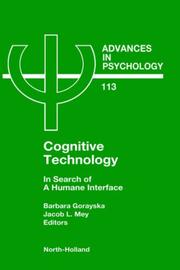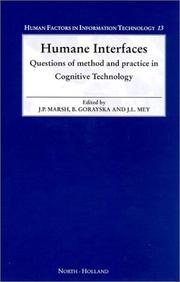| Listing 1 - 5 of 5 |
Sort by
|

ISBN: 0444822755 9786611055332 1281055336 0080529313 9780444822758 9780080529318 Year: 1996 Publisher: Amsterdam ; New York : North Holland, Elsevier Science B.V.,
Abstract | Keywords | Export | Availability | Bookmark
 Loading...
Loading...Choose an application
- Reference Manager
- EndNote
- RefWorks (Direct export to RefWorks)
In this book the editors have gathered a number of contributions by persons who have been working on problems of Cognitive Technology (CT). The present collection initiates explorations of the human mind via the technologies the mind produces. These explorations take as their point of departure the question What happens when humans produce new technologies? Two interdependent perspectives from which such a production can be approached are adopted: How and why constructs that have their origins in human mental life are embodied in physical environments when people fabricate their hab
Artificial intelligence. --- Cognition --- Cognitive science --- Human information processing --- 130.2:6 --- 165.23 --- 681.3*H11 --- AI (Artificial intelligence) --- Artificial thinking --- Electronic brains --- Intellectronics --- Intelligence, Artificial --- Intelligent machines --- Machine intelligence --- Thinking, Artificial --- Bionics --- Digital computer simulation --- Electronic data processing --- Logic machines --- Machine theory --- Self-organizing systems --- Simulation methods --- Fifth generation computers --- Neural computers --- Information processing, Human --- Information theory in psychology --- Perception --- Science --- Philosophy of mind --- Psychology --- 165.23 Kennis: begripsanalyse naar woordbetekenis; betekeningsvraagstuk --- Kennis: begripsanalyse naar woordbetekenis; betekeningsvraagstuk --- 681.3*H11 Systems and information theory: value of information--See also {681.3*E4} --- Systems and information theory: value of information--See also {681.3*E4} --- 130.2:6 Filosofie van de cultuur. Cultuurfilosofie. Cultuursystemen. Kultuurfilosofie-:-Biomedische wetenschappen. Ingenieurswetenschappen. Computerwetenschap. Grafische industrie. Uitgeverij --- Filosofie van de cultuur. Cultuurfilosofie. Cultuursystemen. Kultuurfilosofie-:-Biomedische wetenschappen. Ingenieurswetenschappen. Computerwetenschap. Grafische industrie. Uitgeverij --- Artificial intelligence --- Philosophy and cognitive science. --- Technology --- Human-machine systems. --- Human information processing. --- Human operators (Systems engineering) --- Human subsystems (Systems engineering) --- Man-machine control systems --- Man-machine systems --- Operator-machine systems --- Engineering systems --- Human engineering --- Technology and civilization --- Cognitive science and philosophy --- Philosophy.

ISBN: 9780444822758 0444822755 9780080529318 0080529313 Year: 1996 Publisher: New York Elsevier
Abstract | Keywords | Export | Availability | Bookmark
 Loading...
Loading...Choose an application
- Reference Manager
- EndNote
- RefWorks (Direct export to RefWorks)
In this book the editors have gathered a number of contributions by persons who have been working on problems of Cognitive Technology (CT). The present collection initiates explorations of the human mind via the technologies the mind produces. These explorations take as their point of departure the question “What happens when humans produce new technologies?” Two interdependent perspectives from which such a production can be approached are adopted: & bull; How and why constructs that have their origins in human mental life are embodied in physical environments when people fabricate their habitat, even to the point of those constructs becoming that very habitat & bull; How and why these fabricated habitats affect, and feed back into, human mental life. The aim of the CT research programme is to determine, in general, which technologies, and in particular, which interactive computer-based technologies, are
Book
Abstract | Keywords | Export | Availability | Bookmark
 Loading...
Loading...Choose an application
- Reference Manager
- EndNote
- RefWorks (Direct export to RefWorks)

ISBN: 9780080552132 0080552137 0444828745 9780444828743 1281047619 9786611047610 Year: 1999 Publisher: Amsterdam ; New York : Elsevier,
Abstract | Keywords | Export | Availability | Bookmark
 Loading...
Loading...Choose an application
- Reference Manager
- EndNote
- RefWorks (Direct export to RefWorks)
Ever since the first successful International Cognitive Technology (CT) Conference in Hong Kong in August 1995, a growing concern about the dehumanising potential of machines, and the machining potential of the human mind, has pervaded the organisers' thinking. When setting up the agenda for the Second International CT Conference in Aizu, Japan, in August of 1997, they were aware that a number of new approaches had seen the light, but that the need to integrate them within a human framework had become more urgent than ever, due to the accelerating pace of technological and commercialised devel
Digital
ISBN: 9780080552132 0080552137 Year: 1999 Publisher: New York Elsevier
Abstract | Keywords | Export | Availability | Bookmark
 Loading...
Loading...Choose an application
- Reference Manager
- EndNote
- RefWorks (Direct export to RefWorks)
Ever since the first successful International Cognitive Technology (CT) Conference in Hong Kong in August 1995, a growing concern about the dehumanising potential of machines, and the machining potential of the human mind, has pervaded the organisers' thinking. When setting up the agenda for the Second International CT Conference in Aizu, Japan, in August of 1997, they were aware that a number of new approaches had seen the light, but that the need to integrate them within a human framework had become more urgent than ever, due to the accelerating pace of technological and commercialised developments in the computer related fields of industry and research What the present book does is re-emphasize the importance of the 'human factor' - not as something that we should 'also' take into account, when doing technology, but as the primary driving force and supreme aim of our technological endeavours. Machining the human should not happen, but humanising the machine should. La Humacha should replace the Hemachine in our thinking about these matters.
| Listing 1 - 5 of 5 |
Sort by
|

 Search
Search Feedback
Feedback About UniCat
About UniCat  Help
Help News
News